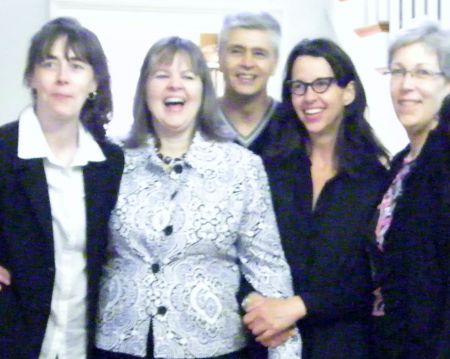The Halifax Humanities 101 program graduated its 6th class at King’s College Chapel on June 4, re-awakening the debate regarding the value of a humanities course for low-income people.
Over 8 months, students of Halifax Humanities attend classes twice a week and read Plato, Homer, Dante, St. Augustine, Shakespeare, Machiavelli, Descartes, Kant, Nietzsche, Alice Munro, and Virginia Woolf – to name a few - in between lectures. The program is free, and books and reading materials are provided for students to keep. University professors, who volunteer their time, teach all classes.
Raising funds for a course that does not bill itself as ‘employment training’ for people on low incomes is not always easy, says Mary Lu Redden, the Director of Halifax Humanities. But according to the program’s participants, the opportunity to study classic works of literature, philosophy and art has a value that’s impossible to quantify.
“It opens up your mind and your heart,” says Bonnie Shepherd, who was one of the program’s first students six years ago. “You have more compassion and empathy when you realize what humans throughout the ages have gone through.”
“When the curriculum was first devised, I wondered if it might be better to be more practical and better suited to the students’ experience,” says Dr. Henry Roper, a volunteer professor from King’s University, who has been with the program from the beginning. But that didn’t seem to be what the participants themselves were looking for, explains Roper, who says the curriculum gets shaped by the needs and wants of the participants each year.
“The opportunity to learn from so many excellent and learned minds has been a remarkable, precious experience,” says Jan G., one of this year’s graduates who asked that her full name not be used. “Learning about the journey of humanity through the ages brings a better sense of understanding the world we live in. This experience has given me more confidence in my approach to life.”
“The great works of the West should be available to anyone who wants to tolle lege [take up and read], to bum a phrase from Augustine,” notes Dr Laura Penny, another volunteer professor with Halifax Humanities. “It's a real joy to be part of a program that makes it clear that reading, thinking, and writing are not elitist or superfluous hobbies, but a way to understand the world and the self.”
“There’s something about the core of Marxism that poor people get right away,” says Dr. Sarah Clift, who teaches Nietzsche, Marx and others as part of the course. “There’s nothing theoretical about it. [The students] understand the alienation of labour immediately.”
It wasn’t Marx who first touched Kathleen Higney, but Socrates. Kathleen remembers her first class in September 2007 on the Socratic method. "I remember wondering ‘What the heck is [the professor] talking about?’ But I was hooked and carried on...listening, questioning, thinking, and writing.” Kathleen has continued studying through the Seminar for Graduates, offered to people who complete the Halifax Humanities 101 course. “I highly recommend Halifax Humanities 101 to adults who love to learn but cannot afford the cost of university tuition and books,” she says.
The course is also an invitation to participate in the broader community – an invitation that is desperately needed and rarely extended, says Clift. “The barrier is real and it has social, spiritual, and financial implications.”
Lauri Noye, one of this year’s graduates, who brightened up the class by bringing her seizure-alert-dog to every session, has felt that isolation in her own life.
“I had become housebound a while ago and this [course] helped me to get out,” says Noye. “I learned a lot about myself and the community and I made new friends. My relationship to the community at large has changed. I found out about things going on that I can participate in and I’m more involved.”
Heather D, who was co-valedictorian of this year's class, had a similar experience. She noticed the change when she found herself attending several New Year’s Levees for the very first time in her life. “I would never have done that before. I have a wider sense of community. Not in a million years would I have come into contact with this group. It’s so outside your known world.” She feels the benefits are not limited to those attending the course. “All the people around me have also been affected. It was a ripple effect. It’s not always a dollars and cents payoff.”
A new course will begin in September of this year. Further information or an application can be found at www.Halifaxhumanities.ca or at (902) 425-7589.
Lamont Dobbin is a recent graduate of the Halifax Humanities course living below the poverty line on a disability pension.



